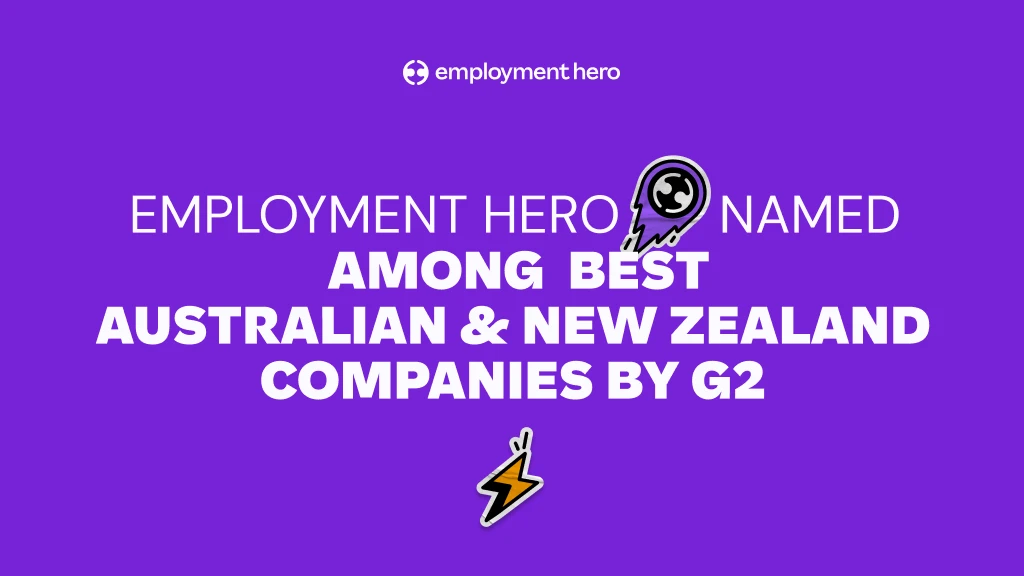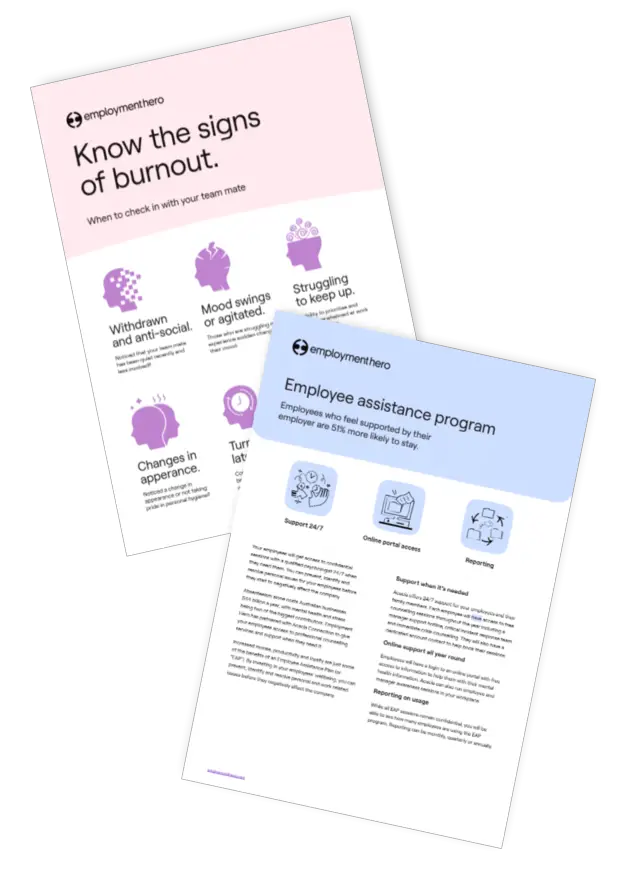How to support employees who are also carers
There’s a growing need for businesses to be aware of the additional weight that affects carers in their team.

Managing work and home life is often a challenge, but it can become even more challenging if you’re a carer for someone close to you. Carers, defined as someone who supports a loved one with a disability or chronic health condition, make up around 10% of the New Zealand population. This number is expected to increase as the general population ages.
While there’s plenty of room for improvement in how employers work with employees with a disability (and in the significant employment gap that exists), there’s also a growing need for businesses to be aware of the additional weight that affects the carers in their team.
We’ll take you through the key challenges experienced by this group and how you as an employer can better support their needs.
Understanding carers and their challenges
According to data from Carers NZ, around two thirds of the 430,000 carers in New Zealand are employed outside of their family caring role. For some, the balance of managing their responsibilities at home and keeping up a job can be too much, making carers much more likely than other New Zealand employees to leave paid employment as a result. Many have cited a lack of flexibility at work or a lack of understanding from their managers as their primary reasons for leaving the workforce.
No employer wants to lose a valued team member. Making sure that you’re giving valuable support to a carer in your team will ensure you don’t lose skilled staff, that you save on recruitment costs and that you’re got a happier, more productive workplace. By recognising the challenges carers face and building a supportive workplace, you’re also making your business a more positive place to work – one that can only benefit you when searching for new team members as well.
Here’s four key steps that employers can take to support carers in their organisation.
Step 1: Create a supportive work environment
It’s a great concept and everyone likes to think that their work environment is one that is supportive of their team – but what does that actually look like in practice? For carers, a supportive work environment is one that gives them a healthy work-life balance, so they can maintain the pressures of work and home without feeling overwhelmed. We’ve got a few practical steps that you can take as an employer to make this happen…
Flexible work arrangements
Giving your employees the opportunity to work around other commitments with flexible work arrangements can be a crucial way to support their work-life balance. It can enable them to support loved ones through medical appointments or to find time to support them in other ways, without feeling like they’re compromising on work.
Our Remote Work Report saw flexible working as the top benefit that employees wanted to see from their workplace, and they have a right to request it too. Employees are legally allowed to request flexible working arrangements from their first day at work, and employers have a legal duty to consider that request within one month. Any declined requests must be on recognised business grounds set out in the Employment Relations Act.
Remember that flexible working can take many forms – it’s not just about flexible hours during the day. It might mean a variation in the place of work (e.g. some work from home days) or considering part-time or job-sharing opportunities.
Paid time off
New Zealand employees are entitled to 10 days of paid sick leave (after six months of continuous employment with the same employer), as well as four weeks annual leave after 12 months. If your employee is struggling to meet their personal commitments and is running out of their leave entitlements, as an employer you may want to consider offering additional sick leave or personal days at your own discretion.
Remember that while leave without pay can be granted by the employer instead, losing that income due to their carer responsibilities can have a significant knock-on effect for your employee. Offering additional paid leave can make a real difference to how they manage work and home.
Employee Assistance Programs (EAPs)
Mental health is a big issue for family carers – a survey by Carers NZ showed that 70% of carers experience depression or anxiety. That’s a huge number of people at risk, and a stat that employers should be keenly aware of. The World Health Organisation estimates that poor mental health costs the economy 4 to 5 percent of GDP every year through lost labour, increased healthcare needs and social spending.
Like physical health issues, mental health issues are unlikely to resolve themselves if nothing is done. Therefore, employers can expect some kind of knock-on effect on their team, whether that’s increased sick days or a loss in productivity. It’s in employers’ best interest to provide non-intrusive support.
Employee Assistance Programs (EAPs) are a great solution. As a service contracted by an employer, it allows an employee to access mental health support confidentially. Having this as an option empowers your team to get support when they need it, without being concerned about cost or stigma.

Step 2: Build awareness and understanding
Part of the challenge employers will inevitably face when supporting carers in their team will be communication. Some carers may feel uneasy about sharing information about their personal commitments, or worry that they’ll be treated unfairly because they’re finding work a challenge. Some may not be willing to share anything at all. The key as an employer is to be compassionate and foster an environment where open communication is both safe and encouraged (but not forced). Here’s a couple of ways to make that happen…
Open communication
Creating a workplace with strong communication is challenging at the best of times. As an employer, you need to be prepared to listen as much as you talk, and to ensure that your workplace is a safe place for everyone.
It’s a big step and we’ve got a few ideas here, including facilitating one-to-one meetings regularly between managers and employees, and encouraging regular feedback. Remember to give opportunities for anonymous feedback too – employees who might feel wary about retaliation will feel more comfortable sharing issues if they don’t have to put a name to it. And importantly, act on that feedback too. For example, if there’s an issue of toxic behaviour or punishments, act on that before it completely stifles any type of healthy communication.
Which leads us to our next point…
Train your team leaders
Lots of people become managers, but nobody joins the workforce knowing exactly how to be a good manager. Effective leadership is a learned skill and in order for your employees to feel confident and supported enough to share, they need good leaders who will know how best to help them.
When appointing managers, ensure they get the right training to handle sensitive issues. This is critical when it comes to managing employees who are carers, or anyone else balancing complex personal issues at home. Managers should know how best to provide support, without becoming intrusive or overstepping boundaries. It’s a trickier balance than it looks, but get it right and your employees will feel so much more secure and supported at work. Get it wrong, and that employee will really struggle.
Step 3: Offer practical benefits
It’s a tough economy right now, and we know that many businesses aren’t able to easily offer salary increases. However, there are other ways to offer additional benefits to your team that won’t break the budget. For carers, some of these benefits can be invaluable.
Workplace benefits
Employers can look to diversify their workplace benefits well beyond the traditional Friday pizzas – today, you can link up with other businesses to offer things like discounts on utilities, subsidised healthcare and special company deals.
In particular, you may want to consider offering healthcare subsidies that extend to your employee’s direct dependants or families. For carers particularly, this can be a significant benefit that will make a difference in their personal lives.
Access to wellness programs
For many carers, it can be easy to let their own physical and mental health slide when so much of their life is focused on others. Giving them access to external wellness programs such as discounted or free exercise classes, subsidised massages or deals on healthy food can go a little way to help them redress the balance if they feel like they need it.
That can also extend to financial wellness and support – statistics show that only 7% of carers have been able to look ahead to save for retirement. Financial stress can add real strain, and employers can offer no-pressure support to help with that. That could include company-wide sessions with an external expert on financial literacy, or an informative lunch and learn session on financial initiatives such as Kiwisaver.

Step 4: Consider implementing policies
If you feel like you want to be clear about your commitment to providing workplace support to carers, you may want to consider creating a formal policy. This policy could detail the benefits you offer, the potential options for additional leave and any other support your company offers. It could also have guidelines for employees should they need to request accommodations and support.
There are a few clear benefits to adding a policy, beyond just being a caring employer:
- Acknowledgement: This policy would show that you recognise the specific strain that carers are under, and that your company is ready to provide support.
- Reassurance: An employee joining your organisation and acknowledging this policy could feel reassured should they take on caring responsibilities outside of work.
- Open communication: As with the points made above about communication, this level of transparency could empower carers in your organisation to look for help if they feel like they need it.
Adding a policy sounds like a lot but it doesn’t have to be. HR software like Employment Hero comes with a policy library, so you can download a template and quickly customise it to your organisation. Then, the policy can be digitally distributed throughout the company.
Supporting your team is important for your business
We hope this blog has given you a few ideas for how you can better support the carers in your organisation. As with supporting all your employees, putting in the work to ensure your team feels comfortable and happy in their role can only benefit your company – both financially and in terms of your reputation. It can also go a long way towards making you appealing as an employer in the future, should you need to hire more team members.
Disclaimer: The information in this blog is current as at 4 April 2024, and has been prepared by Employment Hero Pty Ltd (ABN 11 160 047 709) and its related bodies corporate (Employment Hero). The views expressed in this blog are general information only, are provided in good faith to assist employers and their employees, and should not be relied on as professional advice. The Information is based on data supplied by third parties. While such data is believed to be accurate, it has not been independently verified and no warranties are given that it is complete, accurate, up to date or fit for the purpose for which it is required. Employment Hero does not accept responsibility for any inaccuracy in such data and is not liable for any loss or damages arising either directly or indirectly as a result of reliance on, use of or inability to use any information provided in this article. You should undertake your own research and to seek professional advice before making any decisions or relying on the information in this blog.
Related Resources
-
 Read more: Employment Hero Named Among Best Australian & New Zealand Companies by G2
Read more: Employment Hero Named Among Best Australian & New Zealand Companies by G2Employment Hero Named Among Best Australian & New Zealand Companies by G2
Ranked #6 on G2’s 2026 Best Software Awards, officially a Top 10 software company in ANZ
-
 Read more: Employment Hero Named Among Best Australian & New Zealand Companies By G2
Read more: Employment Hero Named Among Best Australian & New Zealand Companies By G2Employment Hero Named Among Best Australian & New Zealand Companies By G2
Employment Hero has been ranked #6 on G2’s 2026 list of the Best Australian and New Zealand Companies.
-
 Read more: Product Update: January 2026
Read more: Product Update: January 2026Product Update: January 2026
Welcome to the January 2026 product update from the Employment Hero team. We’ve got lots to share around Custom Forms,…























